The truth about body love
I wrote this post originally on Dead of Winter because I keep hearing misconceptions about what it means to love one’s body and I feel that I needed to clear the air about some things. I’d like your thoughts about it. Thanks!
In a previous post, I highlighted and refuted criticisms of body love that I did not feel held water. Without addressing a specific person, I will continue in that vein.
I have heard people criticize body love on the grounds that it teaches people, especially young girls, that appearance is paramount. Instead we should turn our attention to what’s on the inside. I understand this criticism, but again, under closer scrutiny, it doesn’t hold up.
Can people be vain about their appearance and worship appearance above all else? They most certainly can, but people can be just as vain about accomplishments, social status, athletic prowess, health and disability status, personality, or whatever that person has that the have-nots have not.
Exhibit A:
- Look at you! Singing opera by the age of 15! I couldn’t do that until I was in my 30s!
- You’re going to college to be a doctor? Good for you! My kid’s stuck at community college doing automechanics. I told him to get better grades!
- Okay, you ran a mile in ten minutes, but you need to do better than that if you want to stay in shape.
- Wow, you have, like, the healthiest lunches I’ve ever seen! I’m glad SOME teens are responsible enough to care about their health!
- Let’s see, you’re outgoing, you have lots of friends, you’re always getting involved, and you always have a smile! Why shouldn’t people like you?
Discussion:
- In the first example, we are reinforcing the idea that people who do not develop as quickly or who don’t have the same type of voice and musical talents are less than. We are also reinforcing the idea that OH EM GEE, you need to do it while you’re young or else it’s hopeless.
- In the second example, we worship money and high status (which are attained by attending prestigious colleges and getting professional jobs). We look down on those who don’t have a brand name on their degree, who aren’t rich, or who pursue trades instead of professional careers, dismissing them as being less hardworking, less skilled, and less intelligent.
- In the third example, we are teaching young people that if you don’t have the body of a runner, or if you aren’t gifted at it, then you are out of shape. It reinforces the idea that everyone can, and should, be equally physically fit, and that not having this type physical fitness makes you lazy, stupid, and defective.
- In the fourth example, we send the message that your health and lifestyle determine your worth as a person. If the person is disabled, it creates a double-standard. In order to be a “good” disabled person, you must do everything possible to maximize health and look able-bodied. If you have the nerve to actually be disabled, then you are not trying hard enough and not worth as much.
- In the fifth example, we are operating under the assumption that in order to be desirable to others you must have an extroverted personality. It sends the message that your ultimate goal in life is to be desirable to others, and it operates under mistaken ideas about what introversion is about.
They all create pressure on young people to perform at their best, push themselves to the limits, at younger and younger ages, and in all possible areas. Otherwise? You’re a waste of space, full stop.
Are any of these statements substantially different from complimenting someone’s appearance and placing expectations on them to maintain it? Are they any better?
Hardly.
Furthermore, does commenting on someone’s appearance, or paying attention to your own appearance, always have to be shallow? I don’t think so.
Complimenting someone in a way that reinforces existing prejudices is unquestionably shallow. Complimenting a fat person on their weight loss is prejudiced in this culture. Complimenting an African on her newly straightened hair may be prejudiced, but not always. Complimenting someone on their fashion sense or the way they carry themselves isn’t such a bad thing. Our appearance can communicate a lot about ourselves, including what culture, religion, class, and political party we come from. It can tell us about our emotions and hobbies.
Not only our clothes and our accessories, but our bodies can communicate things about us. That is why body modification is practiced in so many cultures in various forms. It is a permanent mark on your person that signifies something important. Scars and deformities are unintentional body modifications that tell stories. Unmodified bodies can reveal information such as what race, culture, or nationality we came from. Posture and facial expressions identify emotions.
Physical features “act” differently. An Asian smile and a Slavic smile look different. Dark skin against bright colors look different from light skin against dark colors. When we combine our unique features with modes of expression like makeup, fashion, etc., it gives us a unique character.
Physical features act as symbols (e.g., fat = fertility). Are they accurate 100% of the time? No. Can the body as symbol have negative connotations? Yes. Can the same feature mean different things in different contexts? Yes. Nonetheless, appearance serves a cultural and aesthetic purpose as symbolism, and we would do well to reclaim it in a positive way.
Because appearance is the first thing we notice about someone, it is popular to demonize groups of people by pointing out undesirable physical features. Jews were often portrayed as having hooked noses. It was an easily identifiable feature that separated the Jews from others. Their noses were distorted to look monstrous, and the feature became synonymous with monstrous qualities such as greed, parasitism, and treachery. The proper solution to that isn’t to say, “Hey, our hooked noses don’t define us.” That allows THEM to control the discussion. You need to reclaim it, make it your own, and make it good.
Our minds may take precedence over our bodies, but they are not separate from us. Our souls LIVE in our bodies. As long as we use our bodies to think, act, and live in the world, our bodies matter. As long as our bodies are the first point of recognition (“Hey, look, it’s Joanna. I can tell the hat!”) then bodies matter. Taking care of them certainly matters, even if you don’t like the way it looks or acts all the time.
Love your body because it’s YOURS. Love it because it is the one possession that no one can ever take from you. You know you live in a totalitarian society when your body is no longer yours. Bodies do matter.
Love it. Love it enough to care for it and peacefully coexist with it. This is your one body and you will live in it forever. There’s no sense not making the most of it.








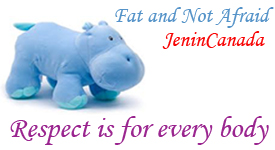

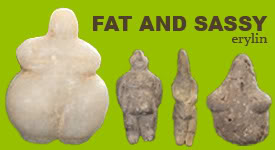
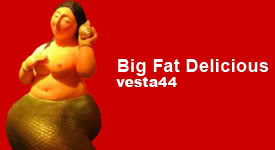




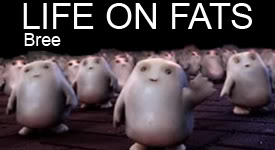



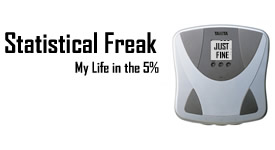


I wish I could learn to love my body. I guess at least I tolerate it a little better these days.